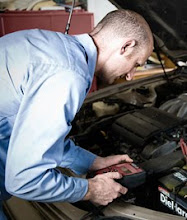"I just had my brakes put on and now they squeak every morning when I pull out of my driveway"
"Does the squeaking go away after a few stops?"
"Yes"
"Aha!"
This makes up a good chunk of the phonecalls I get. We've just put brakes on a car and a week later we hear about the high-pitched bird noises emanating from the wheels of the vehicle. Inevitably this scares people because this sounds like the self-same noise that the brake "wear-indicators" made when they warned them that it was time to change brake pads. But, dear reader, the noise is different! When we buy pads from a vendor (your Napas, Checkers, Auto Zones, etc.), there are a number of different styles to choose from. Some of the pads we intall will have a design lends itself to corrosion buildup. What happens is that this particular type of pad, in humid conditions, develops corrosion on these edges. This tiny amount of corrosion causes a vibration between the pad and the brake rotor which translates to: squeaking. As the corrosion wears away when the brakes heat up, the squeak disappears. However, and here's where this gets tricky, the brake pad isn't the only culprit. If the customer's wheels are built in such a way as to allow moisture buildup on the pad, it doesn't matter how much fine green has been blown on the brake job - they still squeak. Evil cars! Here though, is the inside scoop (because this is always the follow-up question to the one posted above), how the h-e-double hockey-sticks am I supposed to know if my brake are failing because a squeak is a damn squeak?? The answer - you can't. When the tires get rotated, the brakes need to get checked...every time! So here it is, today's inside scoop:
If your brakes are checked every tire rotation, you are less susceptible to some of the dishonest auto repair business sales. Think abou it, if you were told by a shop 6,000 miles ago that your brakes had 70% life left, and the shop you are at is telling you your brakes are toast...time to run or step out to the garage and see for yourself! Likewise, if you know your brakes are at 30% life left, you'll know - long before you spend a lot of money going into your rotors - time to schedule a brake appointment.
Hope this helps.
Subscribe to:
Post Comments (Atom)

No comments:
Post a Comment